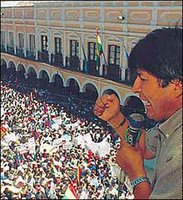Reforma Constitucional Bolivia. El modelo Evo Morales

Bolivians Choose Assembly to Revise Constitution
By THE ASSOCIATED PRESS
Published: July 3, 2006
http://www.nytimes.com/2006/07/03/world/americas/03bolivia.html?n=Top%2fNews%2fWorld%2fCountries%20and%20Territories%2fBolivia
"LA PAZ, Bolivia, July 2 (AP) — Bolivians voted Sunday for a national assembly to retool the Constitution, an important step in President Evo Morales's plans to cement his leftist reforms and give more power to Bolivia's Indian majority.
Voters also decided whether to grant more fiscal and political autonomy to Bolivia's nine states — an issue that has exacerbated longstanding tensions between the country's wealthier eastern lowlands and its poorer highlands.
The referendum has generated criticism of Mr. Morales's close relationship with the Venezuelan president, Hugo Chávez. The main opposition party has accused Mr. Chávez of orchestrating Mr. Morales's campaign to remake the Constitution in Bolivia, South America's poorest country.
Initial surveys of voters leaving the polls showed Morales supporters headed for a majority in the 255-seat assembly, though it was too early to say whether they would secure the two-thirds control required to push through their agenda.
Voters in four states approved autonomy, with five states rejecting it, according to the surveys.
The assembly will begin work on Aug. 6 and take up to a year to rewrite the Constitution. Two-thirds of the body must approve the changes, which then must be endorsed in a nationwide referendum.
Mr. Morales said he wanted Bolivia's constitutional overhaul to serve as an example for Latin America. "The discriminators, the exploiters, the marginalizers, the haters toward the peasant movements have to be stopped, as well as inequality and injustice," he said. Mr. Morales, South America's first Indian leader, has said he would vote no on autonomy.His government has used decrees to advance some goals, such as nationalizing natural gas production in May, and wants the Constitution to enshrine an accelerated transfer of state-owned land to peasants.
The main opposition party, Podemos, favors switching Bolivia to a parliamentary system, thereby weakening the presidency in a country that has had 189 coups since it gained independence in 1825.
Mr. Morales, who won the presidency in December, remains hugely popular. Critics, however, say he will use the assembly to increase his power in the same way as Mr. Chávez, who held a constituent assembly in 1999 that concentrated executive power and hastened his re-election."

<< Home